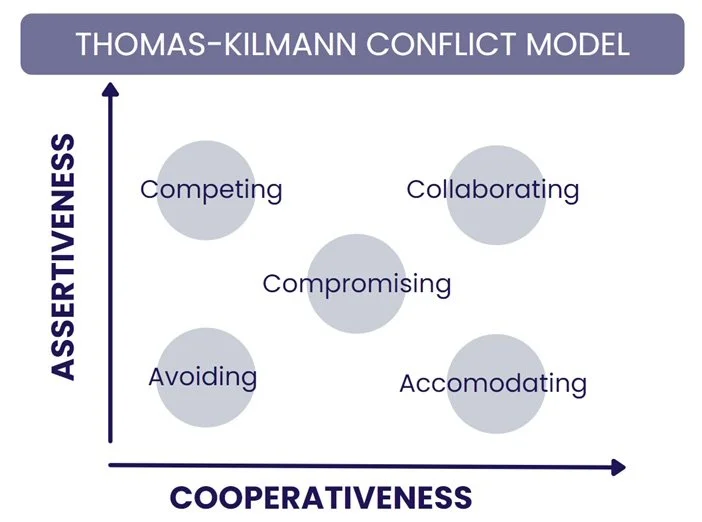What Your Conflict Style Says About You
When I tell you the topic of today’s article, some of you may shutter. So, brace yourself! Here it is—conflict.
Lots of people do not like conflict. It can be tough to deal with! Some others seem to find conflict wherever they go, gaining energy from it or possibly even enjoying it. Your temperament, personality, and life circumstances all form your belief about conflict, and everyone has different experiences with all of these. Thankfully, there are models and theories that help us think it through.
The Thomas-Kilmann Conflict Model
The Thomas-Kilmann Conflict Model gives us great insight into various strategies and categories that people fall into with conflict. Understanding these can give us more self-awareness of our conflict tendencies.
As you see, the above chart has five options that fall among the “cooperativeness” and “assertiveness” axes. Let's go over each option and how they can impact you:
1. Avoiding — Low assertiveness, low cooperativeness.
If you’re an avoider, you will most likely avoid talking about many topics that are important to you. Here, you are not speaking up about your needs and wants, so the other person cannot even have a chance to know what you need and want. Therefore, you both lose in this option.
2. Accommodating — Low assertiveness, high cooperativeness.
When you accommodate, you are being very cooperative but not very assertive. Here, the other person “wins,” and you are taking a risk. You are not speaking up and communicating your needs and wants. You may do something that you do not necessarily want to do, but you are doing it possibly to be kind or generous, or you feel there will be negative consequences if you don’t. If the relationship is reciprocal, you could still get what you want/need, but if it is not, they could take advantage of your kindness. This may leave you feeling resentful. Also, be aware there is a chance you are not aligning with your standards and values when you accommodate. Over time, a relationship like this will become very imbalanced.
3. Competing — High assertiveness, low cooperativeness
Competing is what it sounds like. You are asserting what you’d like and may see your needs and wants as superior to the other person’s. You may “win” here, but it likely leaves the other person feeling unheard, unappreciated, etc. You may eventually lose the relationship if you continuously compete, or the relationship will be only about you and not about the other person.
4. Compromise — Similar assertiveness and cooperativeness
For years, compromise has been deemed something that makes a relationship work well, but in this model, it still may not be the best option. That’s because you could both “win” and “lose” at the same time. Here’s an example: You are in the mood for Italian food, and the other person wants Mexican food. In a compromise, you may say, “It’s okay to get Mexican this time, but next time, we’ll get what I want.” You don’t get what you want this time, but next time, you do.
5. Collaboration — High assertiveness, high cooperativeness
In this option, there is maximum assertiveness and cooperation. Here, both people win! It is the best option for the preservation of the relationship, but as you can imagine, it can take work and time. Going back to the food example, collaboration would suggest you go to the food court and get your Italian while the other gets their Mexican cuisine. Or, you may scratch the idea of Italian and Mexican altogether and decide on something you both genuinely would like to eat, such as sushi or Thai food.
How Do You Experience Conflict With Others?
You may have relationships where you know how to collaborate well; other relationships you may avoid like the plague. So, where are you in this model with most of your relationships? Are you more aggressive as you vocalize your needs and wants—like a competitor? Do you usually withhold your needs and wants and accommodate to make others happy? Have you ever had a relationship where there is compromise or collaboration? Collaborative relationships are generally the most healthy.
Building Collaborative Relationships
There are some practical steps you can take to get to a more collaborative state in your relationships. First, both people need to be on board and respect the other’s needs and wants, so determine that. Then, remember that you are only in charge of yourself. That means you have options on what your next steps are. If you’ve been avoiding talking about your needs and wants, an option is to get the courage to speak up. If the other person is not respectful or regularly does not listen, you can determine if you continue on in that relationship. You may want to repeat your needs and wants several times. If you feel like you have been dominating the relationship, you may want to give space for the other person to say their needs and wants.
Here’s to healthier relationships and more assertive and cooperative communication in conflict!


